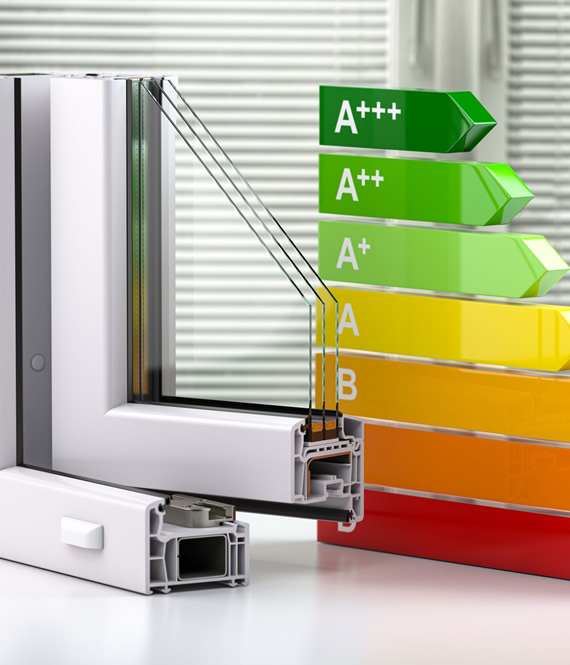
Understanding Window Energy Ratings: A Must For Energy-Efficient Homes
We recommend helpful products in our articles. Read our full disclosure here. The content on this website is not intended to be a substitute for professional advice, diagnosis, or treatment.
When it comes to energy efficiency in our homes, every detail matters, right down to the windows.
Yes, windows!
Understanding window energy ratings is essential to making your home as energy efficient as possible.
What Are Window Energy Ratings?
As you evaluate a home’s ecological footprint, it’s important to know that window energy ratings play a crucial role.
They essentially tell you how well a window performs in terms of energy conservation.
- Window energy ratings are labels that include a letter and color band, ranging from A++ to E. The closer the rating is to A++, the better a window is at its job.
The ratings encompass several factors, including heat gain and loss, light transmission, and air leakage.
- These ratings are determined by the National Fenestration Rating Council (NFRC), an organization responsible for testing and certifying windows, doors, and skylights based on energy performance ratings.
- NFRC has designed an energy-performance label to guide contractors and homeowners in their search for the perfect window.
This makes it easy for consumers to compare products.
The comparison process is further simplified because every ENERGY STAR-qualified window carries an NFRC label.
Consumers also use these ratings as a guide to make informed decisions about the energy impact of their purchases.
If you’re considering aluminium windows or any other type, the energy rating is an invaluable tool for estimating how much energy can be saved.
Why Do Window Energy Ratings Matter?
Window energy ratings are more than just numbers—they have a direct impact on your home’s comfort and energy use.
Here are some critical reasons why they’re so important.
- They Determine The Energy Cost. Windows with higher ratings can reduce the energy needed for heating and cooling, which saves money.
- They Contribute To Home Comfort. Efficient windows enhance indoor comfort by reducing drafts and temperature variations.
- They Provide A Basis For Comparison.
With the rating system, you can easily compare the energy performance of different windows.
Next, it’s worth exploring how these energy ratings are derived.
The Science Behind Window Energy Ratings
The process of calculating window energy ratings is a meticulous one that considers various factors, which include the following.
The U-Factor Or Thermal Transmittance
This value ranges from 0.25 to 1.25 and measures how well a window insulates.
Lower values indicate better insulation.
Solar Heat Gain Coefficient (SHGC)
This value, ranging from 0 to 1, represents the amount of solar radiation that a window allows to pass through.
Lower values are ideal for warm climates, whereas colder climates benefit from higher values.
Visible Light Transmittance (VT)
This value ranges from 0 to 1 and refers to how much visible light a window lets in.
Higher values allow more natural light.
Air Leakage
This value ranges from 0.1 to 0.3 and measures how much air penetrates your home through the window.
Lower values indicate better air sealing.
The lower the value, the more effective the window is at keeping air out.
Understanding these parameters allows for more informed decisions when choosing windows.
Alongside understanding the energy ratings, it’s essential to grasp their impact on your finances.
Window Energy Ratings And Your Wallet
A window’s energy grade can have a substantial effect on your energy costs.
But what does this mean for you financially?
Consider the following points.
- Lower Heating And Cooling Costs. Energy-efficient windows reduce the amount of energy needed for maintaining indoor temperature, lowering utility bills.
- Long-Term Savings.
Although windows with a good energy grade may cost more upfront, the potential long-term energy savings often outweigh the initial cost.
- Increased Home Value.
Energy-efficient homes can have a higher resale value.
Understanding these potential savings can provide a strong motivation to consider energy efficiency in your choice of windows, which can also benefit the environment.
A Greener Planet With Energy-Efficient Windows
Opting for windows with high energy ranking not only benefits homeowners but also contributes to environmental sustainability in the following ways.
- Reduced Energy Use.
Energy-efficient windows minimize the energy needed for heating and cooling, conserving resources.
- Lower Carbon Emissions.
Less energy consumption results in reduced greenhouse gas emissions, contributing to the fight against climate change.
- Conservation Of Natural Resources.
Decreased energy demand means less pressure on natural resources.
After understanding their environmental impact, it’s now time to explore the factors to consider when choosing energy-efficient windows.
Choosing Energy-Efficient Windows: What To Consider
When it comes to picking energy-saving windows for your home, here are crucial elements to keep in mind.
- Climate.
The local climate impacts which energy score is optimal for your windows.
- Energy Costs.
Balancing the upfront cost of windows with the potential long-term energy savings is crucial.
- Material.
The window frame material, such as well-insulating wood or air-leakage-preventing vinyl, is also an important consideration.
Selecting the right windows can be a significant step toward an energy-efficient and comfortable home, and understanding window energy ratings is key to that decision.
Armed with this knowledge, you’re well-equipped to make an informed choice.
Conclusion
This article delved into window energy scores, their measurements, and their significance.
As the world steers toward an energy-efficient future, such knowledge becomes critical.
It’s not just about lower energy bills or more comfortable homes but also about creating a sustainable planet for everyone.
"We love to research problems, examine studies, analyze solutions, and share with you ideas that make life healthier. You can learn about us and our editorial standards here. Have suggestions or feedback to share? Send us a message!."













Leave a Comment